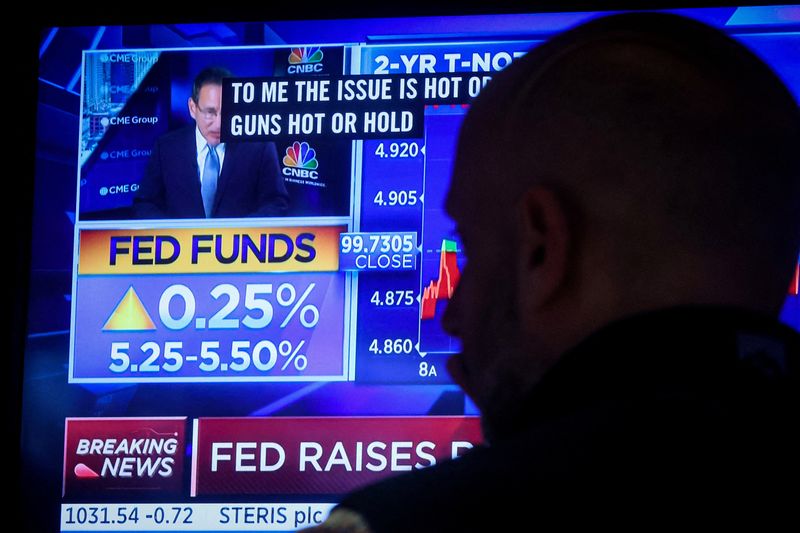By Suzanne McGee
(Reuters) - Investors have poured money into exchange traded funds (ETFs) focused on the US bond market this year, despite a historic sell-off in global bonds and uncertainty over when prices will rebound.
The iShares 20+ Treasury ETF, the market's largest bond ETF and a bellwether for other funds, has seen $17.9 billion in net inflows year-to-date, Morningstar data showed. Its size has nearly doubled to $41 billion in 2023, making it the third most popular ETF in terms of flows this year.
While some investors may be hunting for bargains, analysts and market participants say the move is mostly driven by investors looking for a low-cost way to gain exposure to bonds.
"A lot of institutions, pension funds and family offices have long-term targets that require them to have a certain percentage invested in fixed income," says Bob Tull, co-founder and president of ProcureAM, an asset manager specializing in exchange-traded products. "The easiest way to do this is by using ETFs."
U.S. Federal Reserve interest rate hikes have sent Treasury yields - which move inversely to prices - to their highest levels in more than 15 years. That's put the TLT ETF and other ETFs that hold U.S Treasuries on track for a third straight annual loss, Morningstar data shows. The TLT ETF is down nearly 10% year-to-date.
The sell-off has attracted some investors looking to buy on the cheap, while others have sought to capture the higher distributions by bond ETFs as yields have risen.
But many investors find it easier to meet their fixed income allocation targets through Treasury-focused ETFs, rather than buying the underlying U.S. government bonds or other fixed income instruments.
"They can put more money in more rapidly than by buying bonds directly," said Tull.
Bond ETFs are also benefiting from the long-term trend of investors diverting cash from traditional mutual funds into the ETF market, lured by their lower fees and strong liquidity.
Inflows into taxable bond ETFs totaled $8 billion in September, while investors pulled the same amount from taxable bond mutual funds, according to Morningstar Direct data.
With the market expecting one more Fed hike, ETFs also may appeal to investors still uneasy about volatility, analysts said. Since ETFs trade like stocks, it's faster and easier to adjust exposure than the relatively time-consuming process of buying or selling mutual funds.
Stuart Dybdahl, a portfolio manager at Madison Investments, said his firm had on two occasions this year used ETFs to move out of long-duration bonds and into three to ten-year maturities.
"We may still use mutual funds for core holdings, but ETFs work better for precise targeting" and time-sensitive trades, he said.
Some investors are also shifting to ETFs for tax reasons.
"Right now, anyone who has owned bond (mutual) funds for the last year or two can sell those and lock in a tax loss," says David Botset, managing director of equity product management and innovation at Charles Schwab (NYSE:SCHW) & Co.
"Then they can use cheaper ETFs to regain some of that exposure."
